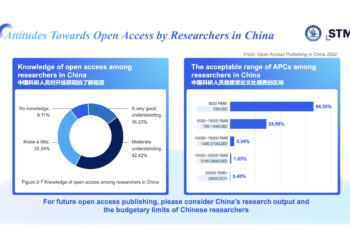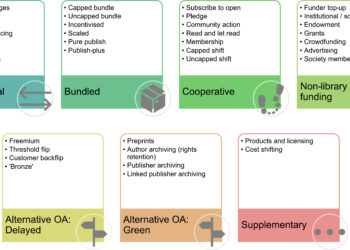The recent nationwide audit of retracted research papers in China has shed light on significant challenges within the academic community. This audit, initiated by the Ministry’s Department of Science, Technology, and Informatization, marks a crucial point in the pursuit of research integrity within China’s academic landscape.
As one of the primary sources of research funding in China, the government holds a vested interest in ensuring that the funds are allocated to projects that uphold the highest standards of integrity and contribute meaningfully to scientific progress. It is crucial to acknowledge this role played by government funding bodies in shaping research practices and promoting integrity. By actively initiating audits and supporting initiatives aimed at enhancing research integrity, government funding bodies send a clear message to researchers that accountability and transparency are paramount. Authors must recognize their responsibility not only to the academic community but also to those who fund their research endeavors.
This also prompts reflection on research integrity and the rising scrutiny surrounding retractions at a broader global scale. The involvement of government funding bodies in addressing integrity challenges reflects a holistic approach to research governance. It underscores the interconnectedness of stakeholders within the research ecosystem and emphasizes the importance of aligning incentives and priorities to foster a culture of integrity and accountability. Can similar efforts be applied globally to cultivate a culture of accountability and transparency?
Implications of Retractions on Trust and Collaboration
The sheer scale of retractions involving Chinese authors has raised concerns about the underlying factors contributing to this issue. While some retractions may stem from genuine errors or oversight, others may be indicative of more nefarious practices such as data fabrication or plagiarism. While addressing these challenges within China is vital, it is also equally important to recognize the global implications of retractions on trust and collaboration in research.
The repercussions of retractions extend beyond individual researchers, impacting institutions, journals, and collaborative research endeavors. Institutions risk damage to their reputation and credibility, while journals face scrutiny over their peer review and editorial processes. Researchers in collaborative projects involving Chinese scholars may also be skeptical and hesitant, hindering research and overall knowledge exchange.
While this audit may be perceived as a response to a research integrity crisis, it presents a unique opportunity for meaningful reform and for cultivating a research culture defined by transparency and accountability, not just in China, but even globally. Institutions in China and beyond, publishers, funding bodies, and industry stakeholders must seize this opportunity to not only rectify past errors, but also establish robust mechanisms that uphold the highest standards of research integrity. By doing this, academia can mitigate the impact of retractions and rebuild trust in the integrity of their research outputs.
Today, as we address the multifaceted implications of retraction audits on researchers in China, it’s essential to acknowledge the conflict many individuals, including you, may experience. It is something that left me conflicted as well. While we don’t wish harm upon honest scientists who make genuine mistakes, the reality of fraud and its repercussions cannot be ignored. Yet, it’s equally crucial to recognize that systemic pressures often underpin fraudulent behavior, prompting us to consider systemic changes to alleviate these pressures.
What can publishers the world over do to support China in its mission to reaffirm its position as a leading contributor to research? As a market, China is increasingly important, so what can we do to better support them as they navigate this minefield?
At the same time, amidst these efforts for institutional improvement, it is crucial to recognize the psychological toll this has taken on researchers in China, especially those who probably who made genuine mistakes and had no intent to deceive. In light of this, it is important to evaluate the impact the audit has had on them and what we can do to support them. Today, let’s examine both the systemic changes required in academia and the support needed to uphold researchers’ well-being.
Systemic Approaches
While retractions can stem from various causes, it is worth examining if there are any systemic weaknesses within the academic ecosystem in China that can be a contributor to the problem. Is the pervasive culture of pressure to publish one of the contributing factors? Does the pressure of frequent publication in high impact journals, career advancement, securing funding, and gaining recognition incentivize unethical behaviors such as data manipulation, plagiarism, and selective reporting, ultimately leading to retractions when these malpractices are uncovered? Furthermore, is this challenge unique to China, or does it reflect a broader global concern?
What can be done to make our peer review processes more robust, so that flawed or fraudulent research does not slip through the cracks?
What strategies can be implemented to encourage institutions to prioritize the quality and impact of research outputs over quantity? Will this shift incentivize authors to prioritize rigor and integrity over meeting publication quotas? Additionally, what support mechanisms can be established for career development and mentorship to help authors navigate the competitive academic landscape without succumbing to undue pressure? As China continues its efforts to improve research integrity, what support can publishers offer?
Can societies and publishers invest in training and education on research ethics and integrity to empower scholars to uphold the highest standards of conduct in their research endeavors? Will workshops, seminars, and training programs focused on research ethics and integrity help authors to recognize and address ethical dilemmas in their work, including issues related to data integrity, authorship, and publication ethics?
Should government agencies worldwide integrate considerations of research integrity into funding criteria and evaluation processes to incentivize authors to prioritize rigor and ethical conduct in their research activities, ultimately preventing misconduct and reinforcing the notion that integrity is essential in responsible research conduct?
Can publishers establish global mentorship programs that pair early-career researchers with experienced mentors across the world so that authors can navigate the publication process, handle ethical challenges, and maintain integrity in research practices?
Can institutions in China establish research integrity offices or committees tasked with providing guidance, resolving ethical issues, and promoting a culture of integrity within the institution?
Addressing the complexities surrounding retractions globally necessitates a multi-faceted approach and answers to some of these questions can pave the way for a more robust and ethically sound academic landscape.
Addressing Researchers’ Well-Being
If we think of it from the Chinese authors’ perspective, this audit has introduced a new layer of complexity for them. Transparent reporting and disclosure of retractions serve as fundamental pillars in this endeavor, ensuring that errors, misconduct, and corrective actions are openly acknowledged and addressed. However, it is equally crucial to prioritize scholars’ well-being throughout this process, recognizing the psychological impact that retraction audits can exact.
Many scholars are probably experiencing heightened levels of stress and anxiety as they grapple with the implications of retractions on their academic reputations and career trajectories. The fear of being implicated in research misconduct or facing disciplinary action looms large and can contribute to a pervasive sense of uncertainty and insecurity. Moreover, the audit process can evoke feelings of inadequacy and self-doubt among scholars, particularly those whose work has been subjected to scrutiny or retraction. The public nature of retractions can be humiliating and demoralizing, exacerbating existing vulnerabilities and undermining scholars’ confidence in their abilities.
It is crucial to acknowledge the human aspect amidst efforts for institutional improvement. While the focus may be on rectifying systemic weaknesses and ensuring compliance with regulatory standards, it is equally important to prioritize scholars’ well-being and mental health. Ignoring the psychological toll of retraction audits not only neglects the holistic needs of scholars but also undermines the effectiveness of institutional reforms.
Addressing the psychological impact of retraction audits requires a multifaceted approach that combines institutional support, peer networks, and access to mental health resources. Institutions must create a supportive environment where scholars feel safe to express their concerns and seek assistance when needed. This may involve providing counseling services, organizing support groups, and promoting a culture of openness and empathy.
Furthermore, efforts to mitigate the emotional strain of retraction audits should extend beyond institutional boundaries to encompass broader societal attitudes and perceptions. Researchers must be assured that their worth is not defined solely by their research outputs and that mistakes or retractions do not diminish their value as individuals or scholars.
Will it help if publishers and societies establish peer support networks offering researchers a sense of belonging and solidarity, enabling them to connect with peers facing similar challenges? These networks can provide a platform for sharing experiences, seeking advice, and offering mutual support. Will this supportive peer group help with some extent to mitigate the psychological toll of the retraction audits?
Recognizing the emotional impact of audits on scholars, institutions and academic organizations should consider prioritizing the establishment of support networks, counseling services, and wellness programs tailored to researchers’ needs. These initiatives provide researchers with a safe space to share their experiences, seek guidance, and access resources to cope with stress, anxiety, and other psychological challenges associated with retraction audits.
Furthermore, fostering open dialogue encourages transparency, collaboration, and mutual support within the academic community. By creating avenues for scholars to discuss their concerns, share best practices, and seek advice, institutions can promote a culture of solidarity and resilience. Open dialogue also facilitates the identification of systemic issues and the development of targeted interventions to address scholars’ well-being needs effectively.
Choosing Collaboration over Condemnation
Instead of condemning those whose papers have been retracted and instead of imposing penalties on them, let’s collaborate with them. Let’s embrace the fundamental belief in the goodness of individuals and come together to tackle integrity challenges in academia head-on. It’s crucial to recognize that research extends far beyond borders and has global ramifications. Let’s choose collaboration over condemnation, understanding over isolation, and unity over division as we navigate the path toward a more robust and inclusive research community.
Discussion
1 Thought on "Navigating the Retraction Minefield in China and Beyond: A Need for Systemic Changes and Increased Focus on Researcher Well-Being"
I don’t believe there is a “minefield” here (except for the politically motivated targetting of academics from minorities). The retractions we are mostly seeing – that is, excluding the politically-motivated hunting – are the proverbial “tip of the iceberg” of the deception and fraud that is rife in a sector of journal publishing powered by “fringe” for-profit publishers using the open access author fee system to garner huge rewards through massive volume publications with completely inadequate peer review and rapid turn-around. The Chinese authorities have brought this on themselves by failing to ensure that the incentives for promotion via publications are linked to quality and integrity. Yes, we can show humanity to those experiencing retractions but these are the “tip of the iceberg” and it is the system of unregulated and unmoderated for-profit publishers who are incentivised to encourage paper mills, citation cartels, authorships for sale, fraudulent and at the very least lax editorial oversight. And let us remember that actual retractions are a fraction of the real problem so only the most extreme infractions are targetted (and are often legally targetted and institutionally protected), which suggests that those so identified have at least something to answer for in a sector where otherwise very high standards of professionalism are expected.




